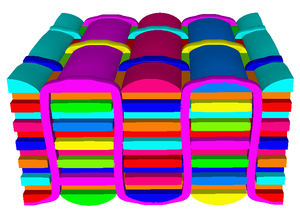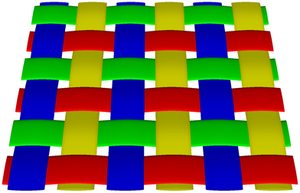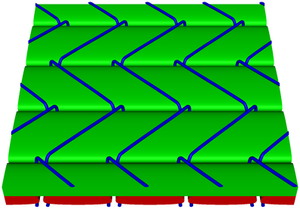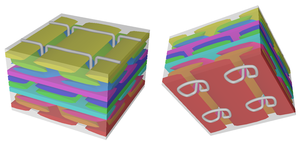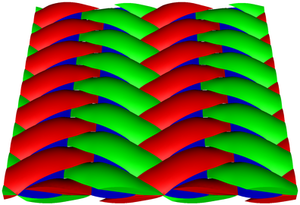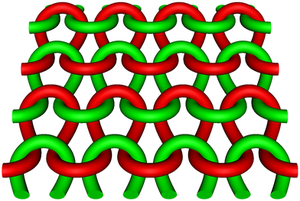Difference between revisions of "Main Page"
(→News) |
|||
| (48 intermediate revisions by the same user not shown) | |||
| Line 3: | Line 3: | ||
[[Image:2DWeave.png|thumb|2d woven fabric]] | [[Image:2DWeave.png|thumb|2d woven fabric]] | ||
[[Image:Ncf.png|thumb|Non-crimp fabric]] | [[Image:Ncf.png|thumb|Non-crimp fabric]] | ||
| + | [[Image:Tufted laminate.png|thumb|Tufted laminate]] | ||
[[Image:Triaxialbraid.png|thumb|Triaxial braid fabric]] | [[Image:Triaxialbraid.png|thumb|Triaxial braid fabric]] | ||
[[Image:Weftknit.png|thumb|Weft knit fabric]] | [[Image:Weftknit.png|thumb|Weft knit fabric]] | ||
| Line 8: | Line 9: | ||
TexGen is open source software licensed under the General Public License developed at the University of Nottingham for modelling the geometry of textile structures. TexGen has been used by the Nottingham team as the basis of models for a variety of properties, including textile mechanics, permeability and composite mechanical behaviour. | TexGen is open source software licensed under the General Public License developed at the University of Nottingham for modelling the geometry of textile structures. TexGen has been used by the Nottingham team as the basis of models for a variety of properties, including textile mechanics, permeability and composite mechanical behaviour. | ||
| − | A summary of our work involving TexGen can be found on the [[TexGen Applications]] page. Please also visit the [http://www | + | A summary of our work involving TexGen can be found on the [[TexGen Applications]] page and a list of publications using TexGen can be found on the [[Publications]] page. Please also visit the [http://www.nottingham.ac.uk/research/groups/composites-research-group/research/textile-composites/textile-composites.aspx University of Nottingham Textile Composites Research] website for more details about our research group. |
| − | + | A User Guide can be found here [[User_Guide]]. Also on this website you will find all the information necessary to get started with TexGen by using the sidebar for navigation. | |
Please leave a message on the [http://texgen.sourceforge.net/phpBB3/index.php TexGen forum] if you find TexGen to be a useful tool. We are very interested to hear about research conducted with TexGen. The [http://texgen.sourceforge.net/phpBB3/index.php forum] is also the place to ask questions, make comments and generally discuss about TexGen with other users. | Please leave a message on the [http://texgen.sourceforge.net/phpBB3/index.php TexGen forum] if you find TexGen to be a useful tool. We are very interested to hear about research conducted with TexGen. The [http://texgen.sourceforge.net/phpBB3/index.php forum] is also the place to ask questions, make comments and generally discuss about TexGen with other users. | ||
| − | Specific bug reports, feature requests and patches are always welcome and should be directed to the [ | + | Specific bug reports, feature requests and patches are always welcome and should be directed to the [https://github.com/louisepb/TexGen GitHub issue tracker]. |
== News == | == News == | ||
| + | |||
| + | ===Please use GitHub for TexGen queries=== | ||
| + | The TexGen forum is being set to 'Read Only' and will not be taking new users for the time being. | ||
| + | |||
| + | You should still be able to search the forum to find useful information from previous conversations. If you have a new question or want to raise an issue about a bug in TexGen please raise an issue on the TexGen GitHub page here: https://github.com/louisepb/TexGen/issues | ||
| + | |||
| + | ===TexGen 3.13.1 Released! === | ||
| + | This is a minor release to correct a bug when exporting a voxel mesh to Abaqus with no boundary conditions. | ||
| + | |||
| + | <small>15:30, 7th August 2023 (BST)</small> | ||
| + | |||
| + | ===TexGen 3.13.0 Released! === | ||
| + | Version 3.13.0 has been released. From this release TexGen will be built with Python 3. Existing scripts should continue to run using the Run Script option in the GUI after the addition of a line to import the TexGen core library (from TexGen.Core import *). | ||
| + | |||
| + | A new class CDomainPrism has been implemented which allows concave sets of domain planes to be specified, e.g. T-shaped or arcs. This is only accessible via scripting. It's use is described in the scripting guide with a sample script. | ||
| + | |||
| + | Layer to layer 3D woven textiles can be created with binder layers following different paths (rather than all binder layers moving together through the layers) using the new CTextileDecoupledLToL class. This is accessible via Python scripting. | ||
| + | |||
| + | There are also various small changes and bug fixes. A list of changes can be found [https://sourceforge.net/projects/texgen/files//texgen/3.13.0/README/view here] | ||
| + | |||
| + | <small>15:30, 27th July 2023 (BST)</small> | ||
| + | |||
| + | === TexGen Chapter in new book: Advanced Weaving Technology === | ||
| + | Published on 3rd April 2022 this book provides state-of-the-art information on weaving technology and 3D fabrics. It examines weaving preparation, mechanics and limits of the weaving processes, pattern design and applications. The TexGen chapter gives a practical overview and introduction to the use of TexGen and the modelling theory used in the software. There is a guide to creating automatically generated textile models using the built-in weave wizards and a detailed example of the method for creating a textile model using the functionality within the graphical user interface (GUI). An overview of the Python application programming interface (API) is given, illustrated by an example script, as well as information on how to use the Python functions to edit existing textiles. Finally there is an overview of the options for different meshing and export options used to prepare models as input for simulations. | ||
| + | |||
| + | The TexGen chapter is available [https://link.springer.com/chapter/10.1007/978-3-030-91515-5_6 here] | ||
| + | |||
| + | <small>11:17, 14 April 2022 (BST)</small> | ||
| + | |||
| + | === TexGen Webinar: Exporting TexGen Models for Simulation=== | ||
| + | ====27th April 2021, 2pm (BST) ==== | ||
| + | |||
| + | This webinar will describe the use of TexGen as a preprocessor for simulations using textile models and will cover: | ||
| + | *The different export options available, including file formats and meshing options | ||
| + | *Examples of different types of simulations using TexGen models, e.g. prediction of mechanical properties and permeability | ||
| + | |||
| + | Video and slides from the webinar are now available: | ||
| + | * [https://youtu.be/BVME9evj0kc Video] | ||
| + | * [http://texgen.sourceforge.net/documents/webinar2_TexGenExport.pdf Slides] | ||
| + | |||
| + | === TexGen Webinar: Introduction to Creating Textile Models Using TexGen=== | ||
| + | ==== 23rd March 2021, 2pm (GMT) ==== | ||
| + | |||
| + | This webinar will give an introduction to TexGen and will cover: | ||
| + | *The use of the TexGen graphical user interface (GUI) to create and edit 2D woven structures. | ||
| + | *An outline of the modelling theory used in the TexGen software which will enable users to make better use of the features available in the software for customising textile models. | ||
| + | |||
| + | Video and slides from the webinar are now available: | ||
| + | * [https://youtu.be/xDYRhVvwd2E Video] | ||
| + | * [http://texgen.sourceforge.net/documents/Webinar1_IntroductionToTexGen.pdf Slides] | ||
| + | |||
| + | ===TexGen 3.12.2 Released! === | ||
| + | Version 3.12.2 has been released. This contains a bugfix to octree refinement when starting with a number of voxels other than 1x1x1 | ||
| + | |||
| + | <small>12:15, 15 March 2021 (GMT)</small> | ||
| + | |||
| + | ===TexGen 3.12.1 Released! === | ||
| + | Version 3.12.1 has been released. This contains extension of the ABAQUS Voxel File export to provide access to the octree refinement with Laplacian smoothing from the GUI. The octree refinement can now be started with a user-specified number of voxels. | ||
| + | |||
| + | Correct Small Intersections tool has been added to the Tools menu (previously only accessible via the ABAQUS Dry Fibre export option). | ||
| + | |||
| + | Tetgen export has been updated to include the o2 option allowing export of quadratic tet element. | ||
| + | |||
| + | There are also various small changes and bug fixes. A list of changes can be found [https://sourceforge.net/projects/texgen/files//texgen/3.12.1/README/view here] | ||
| + | |||
| + | <small>17:00, 12 February 2021 (GMT)</small> | ||
| + | |||
| + | ===TexGen 3.12.0 Released! === | ||
| + | Version 3.12.0 has been released. This contains functions for octree refinement of voxel meshes with Laplacian smoothing. These are available using Python commands and instructions for their use are given here: [[Using Octree Refinement and Mesh Smoothing]] | ||
| + | |||
| + | There are new options to create surface meshes in ABAQUS inp format and voxel meshes in vtu format. | ||
| + | |||
| + | There is a bugfix to the correct reversal of G13 and G23 when calculating material properies using periodic boundary conditions as set up inthe voxel mesh export (issue 22 on GitHub). | ||
| + | |||
| + | A Refresh View option has been added. | ||
| + | There are also various small changes and bug fixes. A list of changes can be found [https://sourceforge.net/projects/texgen/files//texgen/3.12.0/README/view here] | ||
| + | |||
| + | <small>11:12, 11 March 2020 (GMT)</small> | ||
| + | |||
| + | ===TexGen Workshop: A Practical Introduction to Creating Textile Models=== | ||
| + | ====15th November 2019, CMSC, Purdue University, USA==== | ||
| + | • This interactive workshop will demonstrate the use of the TexGen graphical user interface (GUI) to create and edit 2D and 3D woven structures. An outline of the modelling theory used in the TexGen software will be given which will enable the user to make better use of the features available in the software for customising textile models. | ||
| + | |||
| + | • Python scripting for TexGen will be introduced and will be demonstrated both for editing models within the GUI and for creating custom scripts for maximum control over the textile structures created. | ||
| + | |||
| + | • An overview will be given of the use of TexGen as a pre-processor for generating textile models and its use in the multiscale modelling process, including export options which allow TexGen models to be easily exported to third-party software such as ABAQUS which can then be used in simulations for prediction of material properties. | ||
| + | |||
| + | The workshop will be held at the [http://www.Purdue.edu/cmsc Composites Manufacturing and Simulation Centre], Purdue University and is free to attend but places are limited, so booking is essential. Participants will be required to bring their own laptops in order to follow the exercises. | ||
| + | |||
| + | To book a place please register via [https://www.eventbrite.com/e/texgen-workshop-a-practical-introduction-to-creating-textile-models-tickets-73971830737 Eventbrite] | ||
| + | |||
| + | ===TexGen 3.11.0 Released! === | ||
| + | Version 3.11.0 has been released. This contains upgrades to the VTK, wxWidgets, triangle and OpenCASCADE libraries to address issues with the Python 27 version running on Windows 10. | ||
| + | |||
| + | Periodic boundary conditions have been added for rotated textiles in the voxel mesh export. | ||
| + | |||
| + | There are various other small changes and bugfixes. A list of changes can be found [https://sourceforge.net/projects/texgen/files//texgen/3.11.0/README/view here] | ||
| + | |||
| + | <small>15:15, 7 June 2019 (BST)</small> | ||
| + | |||
| + | ===TexGen 3.10.0 Released! === | ||
| + | Version 3.10.0 has been released. This contains a Rotate Textile option which can be used in conjunction with the Layer Textile option to create laminates with different textile orientations. | ||
| + | |||
| + | There are new options to import weave patterns and then create pattern drafts from certain types of weave patterns. | ||
| + | |||
| + | There has been some code optimisation to speed up the functions which calculate volume fraction and yarn orientations in the export functions. | ||
| + | |||
| + | There are various other small changes and bugfixes. A list of changes can be found [https://sourceforge.net/projects/texgen/files//texgen/3.10.0/README/view here] | ||
| + | |||
| + | <small>18:00, 13 December 2017 (GMT)</small> | ||
| + | |||
| + | ===TexGen Survey === | ||
| + | The latest version of TexGen (3.9.0) included an invitation to complete a survey on exit from the program. This takes just a few minutes and can be found [https://nottingham.limequery.com/728617?lang=en here]. If you are a TexGen user we would be grateful if you could find the time to complete this. | ||
| + | |||
| + | The information in the survey is crucial to us as it will help us to put together the case for continued funding of the TexGen project which, for the most part, is supported by UK Research Council funding. | ||
| + | |||
| + | Many thanks for your help! | ||
| + | |||
| + | ===TexGen 3.9.0 Released! === | ||
| + | Version 3.9.0 has been released. This contains functions to create a mesh of the centre plane of yarns using quad elements and functions to find the point on a yarn surface which is closest to a specified point. | ||
| + | |||
| + | On exit from the program a dialog is triggered which points the user to an online survey. This is entirely optional but information about usage and benefit from using the software will help us to make the case with research councils to continue funding the project. This will enable us to continue its development and to keep it as free software. | ||
| + | |||
| + | There are various other small changes and bugfixes. A list of changes can be found [https://sourceforge.net/projects/texgen/files//texgen/3.9.0/README/view here] | ||
| + | |||
| + | |||
| + | <small>13:15, 14 February 2017 (GMT)</small> | ||
| + | |||
| + | ===TexGen 3.8.2 Released! === | ||
| + | Version 3.8.2 has been released. This contains functions to calculate fibre volume fractions of specified domains (unit cells if these correspond) and yarns. Functionality has been added to allow an angle to be specified at a node so that a cross-section can be angled relative to the yarn tangent. Creation of pattern draft for layer-to-layer textiles. Added option to wizards to select whether or not 10% is added to height of default domain. | ||
| + | |||
| + | Windows installation files are available with Python27 to provide compatibility if calling TexGen scripts from within Abaqus 6.14. There seem to be issues on some machines with the Python27 bundled versions. If Python27 is required install Python from here https://www.python.org/downloads/ and then use any of the Python27 files. | ||
| + | |||
| + | There are various other small changes and bugfixes. A list of changes can be found [https://sourceforge.net/projects/texgen/files//texgen/3.8.2/README/view here] | ||
| + | |||
| + | <small>12:11, 19 January 2016 (GMT)</small> | ||
| + | |||
| + | ===TexGen 3.8.0 Released! === | ||
| + | Version 3.8.0 has been released. This contains the addition of a maximum nesting function to layered textiles. Changes to the 2D weave refine options have been implemented to allow more flexibility as to which functions are called when using the API. These have also been changed to allow refinement of non-periodic textiles. Option to select non-periodic mesh when using Tetgen meshing has been implemented. There are various other small changes and bugfixes. A list of changes can be found [https://sourceforge.net/projects/texgen/files//texgen/3.8.0/README/view here]. | ||
| + | |||
| + | <small>16:08, 16 March 2015 (GMT)</small> | ||
| + | |||
| + | ===TexGen 3.7.0 Released! === | ||
| + | Version 3.7.0 has been released. This contains the addition of layered textiles. These can be created from the 2D weave wizard where a number of layers can be specified or from an option in the Textiles menu where different textiles can be stacked by making a selection from those loaded in the GUI. Offsets can be set between the layers and simple nesting is implemented. There are various other small changes and bugfixes. A list of changes can be found [https://sourceforge.net/projects/texgen/files//texgen/3.7.0/README/view here]. | ||
| + | |||
| + | <small>14:36, 7 August 2014 (BST)</small> | ||
| + | |||
| + | ===TexGen 3.6.1 Released! === | ||
| + | Version 3.6.1 has been released. This contains changes to the Volume Mesh export to give matching nodes and elements on opposite faces of the unit cell. ABAQUS input files can then be generated with periodic boundary conditions. (Note that this meshing method is not suitable for 3D weaves with vertical or near-vertical yarns). Changes have been made to the 3D Weave Wizard to allow all warp yarns to be binder yarns. The Window installation files now use Python 2.6 thus giving compatibility with recent versions of ABAQUS. There are various other small changes and bugfixes. A list of changes can be found [https://sourceforge.net/projects/texgen/files//texgen/3.6.1/README/view here]. | ||
| + | |||
| + | <small>15:19, 27 January 2014 (GMT)</small> | ||
| + | |||
| + | ===TexGen 3.6.0 Released! === | ||
| + | Version 3.6.0 has been released. This contains the addition of a sheared textile option to the 2D weave wizard. This will automatically generate sheared 2D textiles and includes a refine option to minimise yarn intersections. Associated sheared domain, sheared voxels and periodic boundary conditions may also be created. An option to create staggered periodic boundary conditions has been added for textiles which include an offset repeat, so as to minimise unit cell size. There are various other small changes and bugfixes. A list of changes can be found [https://sourceforge.net/projects/texgen/files//texgen/3.6.0/README/view here]. | ||
| + | |||
| + | <small>13:41, 8 August 2013 (BST)</small> | ||
===TexGen 3.5.3 Released! === | ===TexGen 3.5.3 Released! === | ||
Latest revision as of 09:39, 9 June 2025
TexGen is open source software licensed under the General Public License developed at the University of Nottingham for modelling the geometry of textile structures. TexGen has been used by the Nottingham team as the basis of models for a variety of properties, including textile mechanics, permeability and composite mechanical behaviour.
A summary of our work involving TexGen can be found on the TexGen Applications page and a list of publications using TexGen can be found on the Publications page. Please also visit the University of Nottingham Textile Composites Research website for more details about our research group.
A User Guide can be found here User_Guide. Also on this website you will find all the information necessary to get started with TexGen by using the sidebar for navigation.
Please leave a message on the TexGen forum if you find TexGen to be a useful tool. We are very interested to hear about research conducted with TexGen. The forum is also the place to ask questions, make comments and generally discuss about TexGen with other users.
Specific bug reports, feature requests and patches are always welcome and should be directed to the GitHub issue tracker.
News
Please use GitHub for TexGen queries
The TexGen forum is being set to 'Read Only' and will not be taking new users for the time being.
You should still be able to search the forum to find useful information from previous conversations. If you have a new question or want to raise an issue about a bug in TexGen please raise an issue on the TexGen GitHub page here: https://github.com/louisepb/TexGen/issues
TexGen 3.13.1 Released!
This is a minor release to correct a bug when exporting a voxel mesh to Abaqus with no boundary conditions.
15:30, 7th August 2023 (BST)
TexGen 3.13.0 Released!
Version 3.13.0 has been released. From this release TexGen will be built with Python 3. Existing scripts should continue to run using the Run Script option in the GUI after the addition of a line to import the TexGen core library (from TexGen.Core import *).
A new class CDomainPrism has been implemented which allows concave sets of domain planes to be specified, e.g. T-shaped or arcs. This is only accessible via scripting. It's use is described in the scripting guide with a sample script.
Layer to layer 3D woven textiles can be created with binder layers following different paths (rather than all binder layers moving together through the layers) using the new CTextileDecoupledLToL class. This is accessible via Python scripting.
There are also various small changes and bug fixes. A list of changes can be found here
15:30, 27th July 2023 (BST)
TexGen Chapter in new book: Advanced Weaving Technology
Published on 3rd April 2022 this book provides state-of-the-art information on weaving technology and 3D fabrics. It examines weaving preparation, mechanics and limits of the weaving processes, pattern design and applications. The TexGen chapter gives a practical overview and introduction to the use of TexGen and the modelling theory used in the software. There is a guide to creating automatically generated textile models using the built-in weave wizards and a detailed example of the method for creating a textile model using the functionality within the graphical user interface (GUI). An overview of the Python application programming interface (API) is given, illustrated by an example script, as well as information on how to use the Python functions to edit existing textiles. Finally there is an overview of the options for different meshing and export options used to prepare models as input for simulations.
The TexGen chapter is available here
11:17, 14 April 2022 (BST)
TexGen Webinar: Exporting TexGen Models for Simulation
27th April 2021, 2pm (BST)
This webinar will describe the use of TexGen as a preprocessor for simulations using textile models and will cover:
- The different export options available, including file formats and meshing options
- Examples of different types of simulations using TexGen models, e.g. prediction of mechanical properties and permeability
Video and slides from the webinar are now available:
TexGen Webinar: Introduction to Creating Textile Models Using TexGen
23rd March 2021, 2pm (GMT)
This webinar will give an introduction to TexGen and will cover:
- The use of the TexGen graphical user interface (GUI) to create and edit 2D woven structures.
- An outline of the modelling theory used in the TexGen software which will enable users to make better use of the features available in the software for customising textile models.
Video and slides from the webinar are now available:
TexGen 3.12.2 Released!
Version 3.12.2 has been released. This contains a bugfix to octree refinement when starting with a number of voxels other than 1x1x1
12:15, 15 March 2021 (GMT)
TexGen 3.12.1 Released!
Version 3.12.1 has been released. This contains extension of the ABAQUS Voxel File export to provide access to the octree refinement with Laplacian smoothing from the GUI. The octree refinement can now be started with a user-specified number of voxels.
Correct Small Intersections tool has been added to the Tools menu (previously only accessible via the ABAQUS Dry Fibre export option).
Tetgen export has been updated to include the o2 option allowing export of quadratic tet element.
There are also various small changes and bug fixes. A list of changes can be found here
17:00, 12 February 2021 (GMT)
TexGen 3.12.0 Released!
Version 3.12.0 has been released. This contains functions for octree refinement of voxel meshes with Laplacian smoothing. These are available using Python commands and instructions for their use are given here: Using Octree Refinement and Mesh Smoothing
There are new options to create surface meshes in ABAQUS inp format and voxel meshes in vtu format.
There is a bugfix to the correct reversal of G13 and G23 when calculating material properies using periodic boundary conditions as set up inthe voxel mesh export (issue 22 on GitHub).
A Refresh View option has been added. There are also various small changes and bug fixes. A list of changes can be found here
11:12, 11 March 2020 (GMT)
TexGen Workshop: A Practical Introduction to Creating Textile Models
15th November 2019, CMSC, Purdue University, USA
• This interactive workshop will demonstrate the use of the TexGen graphical user interface (GUI) to create and edit 2D and 3D woven structures. An outline of the modelling theory used in the TexGen software will be given which will enable the user to make better use of the features available in the software for customising textile models.
• Python scripting for TexGen will be introduced and will be demonstrated both for editing models within the GUI and for creating custom scripts for maximum control over the textile structures created.
• An overview will be given of the use of TexGen as a pre-processor for generating textile models and its use in the multiscale modelling process, including export options which allow TexGen models to be easily exported to third-party software such as ABAQUS which can then be used in simulations for prediction of material properties.
The workshop will be held at the Composites Manufacturing and Simulation Centre, Purdue University and is free to attend but places are limited, so booking is essential. Participants will be required to bring their own laptops in order to follow the exercises.
To book a place please register via Eventbrite
TexGen 3.11.0 Released!
Version 3.11.0 has been released. This contains upgrades to the VTK, wxWidgets, triangle and OpenCASCADE libraries to address issues with the Python 27 version running on Windows 10.
Periodic boundary conditions have been added for rotated textiles in the voxel mesh export.
There are various other small changes and bugfixes. A list of changes can be found here
15:15, 7 June 2019 (BST)
TexGen 3.10.0 Released!
Version 3.10.0 has been released. This contains a Rotate Textile option which can be used in conjunction with the Layer Textile option to create laminates with different textile orientations.
There are new options to import weave patterns and then create pattern drafts from certain types of weave patterns.
There has been some code optimisation to speed up the functions which calculate volume fraction and yarn orientations in the export functions.
There are various other small changes and bugfixes. A list of changes can be found here
18:00, 13 December 2017 (GMT)
TexGen Survey
The latest version of TexGen (3.9.0) included an invitation to complete a survey on exit from the program. This takes just a few minutes and can be found here. If you are a TexGen user we would be grateful if you could find the time to complete this.
The information in the survey is crucial to us as it will help us to put together the case for continued funding of the TexGen project which, for the most part, is supported by UK Research Council funding.
Many thanks for your help!
TexGen 3.9.0 Released!
Version 3.9.0 has been released. This contains functions to create a mesh of the centre plane of yarns using quad elements and functions to find the point on a yarn surface which is closest to a specified point.
On exit from the program a dialog is triggered which points the user to an online survey. This is entirely optional but information about usage and benefit from using the software will help us to make the case with research councils to continue funding the project. This will enable us to continue its development and to keep it as free software.
There are various other small changes and bugfixes. A list of changes can be found here
13:15, 14 February 2017 (GMT)
TexGen 3.8.2 Released!
Version 3.8.2 has been released. This contains functions to calculate fibre volume fractions of specified domains (unit cells if these correspond) and yarns. Functionality has been added to allow an angle to be specified at a node so that a cross-section can be angled relative to the yarn tangent. Creation of pattern draft for layer-to-layer textiles. Added option to wizards to select whether or not 10% is added to height of default domain.
Windows installation files are available with Python27 to provide compatibility if calling TexGen scripts from within Abaqus 6.14. There seem to be issues on some machines with the Python27 bundled versions. If Python27 is required install Python from here https://www.python.org/downloads/ and then use any of the Python27 files.
There are various other small changes and bugfixes. A list of changes can be found here
12:11, 19 January 2016 (GMT)
TexGen 3.8.0 Released!
Version 3.8.0 has been released. This contains the addition of a maximum nesting function to layered textiles. Changes to the 2D weave refine options have been implemented to allow more flexibility as to which functions are called when using the API. These have also been changed to allow refinement of non-periodic textiles. Option to select non-periodic mesh when using Tetgen meshing has been implemented. There are various other small changes and bugfixes. A list of changes can be found here.
16:08, 16 March 2015 (GMT)
TexGen 3.7.0 Released!
Version 3.7.0 has been released. This contains the addition of layered textiles. These can be created from the 2D weave wizard where a number of layers can be specified or from an option in the Textiles menu where different textiles can be stacked by making a selection from those loaded in the GUI. Offsets can be set between the layers and simple nesting is implemented. There are various other small changes and bugfixes. A list of changes can be found here.
14:36, 7 August 2014 (BST)
TexGen 3.6.1 Released!
Version 3.6.1 has been released. This contains changes to the Volume Mesh export to give matching nodes and elements on opposite faces of the unit cell. ABAQUS input files can then be generated with periodic boundary conditions. (Note that this meshing method is not suitable for 3D weaves with vertical or near-vertical yarns). Changes have been made to the 3D Weave Wizard to allow all warp yarns to be binder yarns. The Window installation files now use Python 2.6 thus giving compatibility with recent versions of ABAQUS. There are various other small changes and bugfixes. A list of changes can be found here.
15:19, 27 January 2014 (GMT)
TexGen 3.6.0 Released!
Version 3.6.0 has been released. This contains the addition of a sheared textile option to the 2D weave wizard. This will automatically generate sheared 2D textiles and includes a refine option to minimise yarn intersections. Associated sheared domain, sheared voxels and periodic boundary conditions may also be created. An option to create staggered periodic boundary conditions has been added for textiles which include an offset repeat, so as to minimise unit cell size. There are various other small changes and bugfixes. A list of changes can be found here.
13:41, 8 August 2013 (BST)
TexGen 3.5.3 Released!
Version 3.5.3 has been released. This contains modification of the PointInsideYarn function to give correct solutions for yarns with both convex and concave yarn sections. There are improvements to the 3D orthogonal weave refine option. Scripts have been made available to give automatic extraction of material properties following simulations using the Abaqus voxel mesh option. There are various optimisation changes and bugfixes. A list of changes can be found here. 13.56, 12 November 2012 (GMT)
TexGen 3.5.2 Released!
Version 3.5.2 has been released. This contains the addition of a refine option to the 3D orthogonal weave. The geometry is adjusted to achieve a given overall fabric thickness. Fibre orientation calculations have been improved to reflect the variations in yarn cross-sections and a render fibre orientation functions has been added to the user interface. A rectangular yarn section has been added. There are also various bug fixes. Windows 32 and 64 bit installers are now available. A list of changes can be found here.
Workshop Presentations
The presentations from the TexGen workshop held at the East Midlands Conference Centre on 2nd May 2012 are now available to view on the Documentation page here.
14:09, 8 May 2012 (GMT)
TexGen 3.5.1 Released!
Version 3.5.1 has been released. This contains the addition of offset angle interlock weaves and specification of power ellipse power in the 3d weave wizard. An export function has been added which uses the open source software Tetgen to generate tetrahedral meshes. It also contains the addition of an x offset to the power ellipse section and various bug fixes. A list of changes can be found here.
14:20, 1 March 2012 (GMT)
TexGen 3.5.0 Released!
Version 3.5.0 has been released. This contains a new wizard for automatic creation of idealised orthogonal, angle interlock and layer-to-layer 3d textile weaves. It also contains various bug fixes. A list of changes can be found here.
16:00, 13 October 2011 (GMT)
TexGen 3.4.1 Released!
Version 3.4.1 has been released. This contains minor changes to ABAQUS voxel mesh output and some bug fixes. A list of changes can be found here.
15:09, 22 June 2011
TexGen 3.4.0 Released!
Version 3.4.0 has been released. It contains the addition of periodic boundary conditions to the Abaqus voxel mesh output. The dry fibre volume mesh intersection correction has been improved and an additional option added to regenerate the textile model using the adapted mesh following correction. There are also some bug fixes. A list of changes can be found here.
14:49, 16 March 2011 (GMT)
TexGen 3.3.3 Released!
Version 3.3.3 has been released. It contains new features to save fibre and/or matrix as a voxel mesh in Abaqus format, to assign fibre properties to individual yarns and to adjust for small intersections in dry fibre volume mesh when outputting to Abaqus format. There are also some bug fixes. A list of changes can be found here.
4 November 2010
TexGen 3.3.2 Released!
Version 3.3.2 has been released. It contains new features to save fibre models to Abaqus output, render fibre volume mesh and render interference depth. There are also some bug fixes, in particular a couple to get the GUI working in the Linux version. A list of changes can be found here.
15 June 2010
TexGen 3.3.1 Released!
Version 3.3.1 has been released (currently only Windows versions). It contains a couple of bug fixes and an option to switch output of messages on and off. A list of changes can be found here.
17 March 2010
TexGen 3.3.0 Released!
Version 3.3.0 has been released, it has various bug fixes most notably to the volume mesher and a few new algorithms dealing with geometry prediction based on mechanical behaviour of yarns. A list of changes can be found here.
16:52, 9 April 2008 (GMT)
TexGen 3.2.1 Released!
Version 3.2.1 has been released, this is mainly a bug fix release however there are a few new features. A list of changes can be found here.
04:12, 13 November 2007 (PST)
